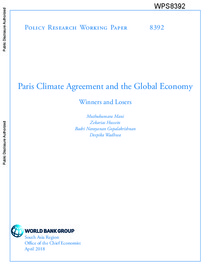Paris climate agreement and the global economy : winners and losers
"The 2015 Paris Climate Agreement was the first instance of countries adhering to take a collective action against global warming. More than 190 countries came forward and submitted their contributions in the form of Intended Nationally Determined Contributions, reflective of their ability and...
| Main Authors: | , , , |
|---|---|
| Institution: | ETUI-European Trade Union Institute |
| Format: | TEXT |
| Language: | English |
| Published: |
Washington, DC
2018
World Bank |
| Subjects: | |
| Online Access: | https://www.labourline.org/KENTIKA-19390316124911185989-Paris-climate-agreement-and-th.htm |
| _version_ | 1771659898958905345 |
|---|---|
| author | Wadhwa, Deepika Mani, Muthukumara Hussein, Zekarias Badri Narayanan Gopalakrishnan |
| author_facet | Wadhwa, Deepika Mani, Muthukumara Hussein, Zekarias Badri Narayanan Gopalakrishnan |
| collection | Library items |
| description | "The 2015 Paris Climate Agreement was the first instance of countries adhering to take a collective action against global warming. More than 190 countries came forward and submitted their contributions in the form of Intended Nationally Determined Contributions, reflective of their ability and capacity to reduce greenhouse gas emissions, as each country set its own targets and actions. For some countries, it meant a significant decline in their emissions by 2030, while others, like China, the United States, and India, decided on a more gradual phasing out extending beyond 2030. This paper estimates the economic impacts of implementation of the Paris Climate Agreement in terms of its implications for welfare, gross domestic product, investments, and trade for major countries and regions. It uses a computable general equilibrium framework to model global, regional, and country impacts. The analysis suggests that the economic impacts will be mostly felt in the European Union if the Paris Agreement is fully implemented. The European Union is likely to suffer a welfare loss of 1.0 to 1.5 percent by 2030. Among non-European countries, Australia, New Zealand, and Mexico will also be affected, with an expected welfare loss of about 1.5 percent. Some of the major emitters, such as China and India, will experience minimal impacts to their welfare, and the United States will experience a welfare loss of only about 0.7 by 2030. The sectoral analysis of production and trade suggests a significant loss to fossil fuel–based sectors, while clean energy sectors can experience significant gains." |
| format | TEXT |
| geographic | international |
| id | 19390316124911185989_8d90076af873477c82bb9976d4a0dbb4 |
| institution | ETUI-European Trade Union Institute |
| is_hierarchy_id | 19390316124911185989_8d90076af873477c82bb9976d4a0dbb4 |
| is_hierarchy_title | Paris climate agreement and the global economy : winners and losers |
| language | English |
| physical | 33 p. Digital |
| publishDate | 2018 |
| publisher | Washington, DC World Bank |
| spellingShingle | Wadhwa, Deepika Mani, Muthukumara Hussein, Zekarias Badri Narayanan Gopalakrishnan climate change international agreement gas emission economic implication Paris climate agreement and the global economy : winners and losers |
| thumbnail | https://www.labourline.org/Image_prev.jpg?Archive=133703595198 |
| title | Paris climate agreement and the global economy : winners and losers |
| topic | climate change international agreement gas emission economic implication |
| url | https://www.labourline.org/KENTIKA-19390316124911185989-Paris-climate-agreement-and-th.htm |

